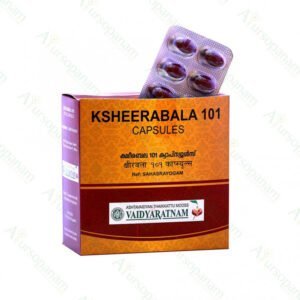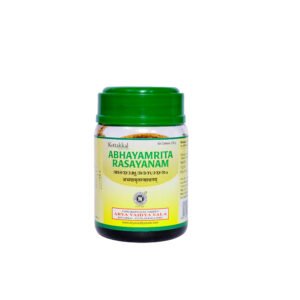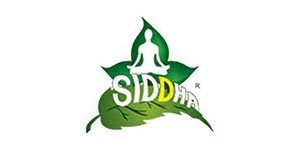Devadarvarishtam is a traditional recipe that helps in resetting your digestion and metabolism. It is authentically mentioned in the context of ‘Prameha Chikitsa’ in Bhaishajyaratnavali. The formula of Devadarvarishtam is very beneficial in managing lifestyle disorders, irritable bowel and chronic infections.
Arishtas are mildly alcoholic preparations. The sweet taste of Devadarvarishtam makes it palatable to kids and adults alike. The alcohol base makes it quick-acting and efficient.
Features & Benefits
- Devadarvarishtam is an aromatic combination of Devadaru (Cedrus deodara), Vasa(Adathoda vasica),Manjishta (Rubia Cordifolia), Indrayava (Holorrhoena antidysentrica), Danthi (Baleospermum montanum), Tagara (Valeriana wallichi), Haridra (Curcuma longa), Daruharidra (Coccinium fenestratum),Mustha (Cyperus rotundus),Khadira (Acacia catechu), Arjuna (Terminalia arjuna), Guduchi (Tinosporia cordifolia), Chandana (Santalum alba), Chitraka (Plumbago zeylanica),Dhataki (Woodfordia fruticosa),Nagara (Zingiber officinale), Maricha (Piper nigrum),Lavanga (Syzigium aromaticum), Ela (Eletteria cardamomum)and Kesara (Messua ferra)etc. in a mildly alcoholic base of jaggery and honey.
- Diabetes patients are often prone to recurrent infection and inflammation. Devadarvarishtam endows sustained skin health and disease resistance in these individuals.
- It has distinct anti-microbial action. Used in preventing recurrent fungal infections.
- It is beneficial in managing chronic ulcers, blisters and skin lesions. Prevents allergic rashes and pruritus.
- It is helpful in preventing recurrent urinary tract infections and difficulty in micturition.
- Devadarvarishtam pacifies ‘Vata’ dosha in the pelvic region. Encourages optimum digestion, absorption and bowel movement. It relieves constipation and irritable bowel.
Dosage and Instructions
Adult: 25-30 ml Devadarvarishtam twice or thrice daily after food.
Child: 10-15 ml Devadarvarishtam once or twice daily after food.
Key Ingredients
Devadaru (Cedrus deodara)It is also is known as Cedrus deodara or Himalayan cedar. It is very effective in neurological disorders, asthma, pruritus, infested wound. Devadaru is also effective in arthritis and headache. Deodar oil contains two major sesquiterpenoids a and ß- himachalenes. Deodardione and deodardione are also isolated from the essential oil. The oil shows invitro antibacterial, antifungal and anti-inflammatory activity. The volatile oil extracted by steam distillation of the wood of Cedrus deodara was examined for its oral anti-inflammatory and analgesic activity at the doses of 50 and 100 mg/kg body weight and was found very effective.
Vasaka (Adathoda vasika)
Vasaka herb is used for treating cold, cough, chronic bronchitis and asthma. in acute stages of bronchitis, Vasaka gives unfailing relief, especially where the sputum is thick and sticky. It liquefies the sputum so that it is brought up more easily. For relief in asthma, the dried leaves should be smoked. The juice from its leaves should be given in doses of 2 to 4 grams in treating diarrhea and dysentery.
Manjishta (Rubia Cordifolia)
Manjistha or Indian Madder is considered to be one of the best blood-purifying herbs. It is mainly used to break down blockages in the blood flow and remove stagnant blood. Manjistha herb can be used both internally and externally on skin for promoting skin whitening. It helps manage acne and pimples by inhibiting the growth of acne-causing bacteria due to its antioxidant property.
Thagara (Valeriana wallichii)
It is also called as Valeriana wallichii. It calms the mind by interfering with brain chemicals (GABA) that communicate information between the nerve cells in the brain. It induces good sleep and reduced stress. Indian Valerian is recommended for the treatment of insomnia. It stimulates the central nervous system and reduces spasms and anxiety. Records have shown that the herb, which grows in abundance in the temperate Himalayan regions, has been medicinally used in the 16th century to treat trembling, delirium tremens, headaches and heart palpitations.
Haridra (Curcuma longa)
Haridra is also called known as Curcuma longa. The anti-inflammatory and antioxidant properties of Haridra assist in preventing the progression of diabetes-related changes in organs like the kidneys, retina, nerve cells and minute blood vessels in the body. Turmeric is a vital herb in Ayurvedic medicine, whose spice form can be recognized by its dazzling, yellow color. The root of the herb, used either fresh or dried, has a host of medicinal benefits. It acts as a carminative and also enhances the complexion and skin tone. in addition, Turmeric can be used to combat liver damage, respiratory disorders and ulcers. Due to its Ushna, Veerya does Vatashaman and is helpful in Vataja Prameha. By effectively combating Kapha and Pitta, Haridra regularizes and stabilizes the gut and cellular metabolism. The cells are detoxified, blockages get removed, and all the channels are cleansed.
Daruharidra (Berberis aristata)
Also known as Haldi, this vibrant yellow-colored spice checks the worsening of Pitta doshas like jaundice. The powerful anti-inflammatory and antiseptic properties of turmeric help in evading infections and treats various skin conditions. Tree Turmeric is a revered herb in Ayurvedic medicine. Possessing antibacterial, anti-inflammatory, antipyretic and antiseptic properties, the herb is used as a cholagogue, stomachic, laxative and diaphoretic.
Rasna (Alpinia Galanga)
It is also known as Alpinia Galanga is an Ayurvedic Medicinal which is a rhizome grown in most of Southeast Asia and is used in cooking and homemade remedies. Rasnaplant is used in many Ayurvedic medicines in India, Tibet, Africa to help with inflammation, bronchitis, asthma, cough, indigestion, piles, joint pains, obesity, diabetes. The paste of the leaf is also applied externally to reduce swelling.
Vidanga (Embelia Ribes)
It is commonly known as false black pepper. This herb helps to relieve constipation. When consumed in the form of tea, it helps in emptying the bowel. It normalizes Agni and prevents indigestion. It has laxative, antifungal, antibacterial properties.
Musta (Cyperus rotundus)It is commonly known as common nutsedge. Effective in gastritis, irritable bowel syndrome. Due to its breast purification property, it is used during postpartum care to avoid indigestion to the child. Nut Grass has a long history of medicinal use in the Ayurvedic system of medicine. Its benefits have been documented in the Charaka Samhita, one of Ayurveda’s prime texts. The herb also features heavily in the medicinal texts of Chinese Traditional Medicine (CTM). in CTM, Nut Grass is credited with the ability to restore ‘Qi’, the natural patterns in which the body functions.
Khadira (Acacia catechu)
It is commonly known as Karingali. Used for stomach problems such as diarrhea, swelling of the colon (colitis) and indigestion. It is also used orally for pain from osteoarthritis and topically to treat pain, bleeding, and swelling (inflammation).
Arjuna (Terminalia arjuna)
Arjuna extracts have been widely used in Ayurvedic medicine. The bark of the tree has been used for several centuries for treating cardiovascular ailments. It has a host of other therapeutic benefits including treating asthma, hypertension and kidney stones. Arjuna, a deciduous tree native to India, can grow up to a height of 27 meters. The tree is also found in Myanmar and Sri Lanka.
Chandana (Santcalum album)Sandalwood or Svetchandan is also known as Srigandha as per Ayurveda. It is one of the oldest and most precious sources of natural fragrance with immense medicinal and commercial significance. Sandalwood oil has various benefits for the skin. The topical application of sandalwood oil on the face helps promote skin cell growth. Generally, it is considered as the best remedy for headaches when applied in the form of paste or oil. Inhalation of Sandalwood oil also helps to manage respiratory infections that work by reducing the inflammation in the lung airways due to its anti-inflammatory property.
Guluchi (Tinospora cordifolia)
It is a well-recognized and widely distributed traditional plant that is used successfully in Indian Ayurveda medicine. Guduchi helps increase the effectiveness of protective white blood cells which fight infection. The herb also augments immune responses to infections by influencing various immune effector cells and ensures early recovery. It’s effective in infections in the respiratory system, skin and soft tissues, infected wounds, especially in diabetic conditions and immune-compromised conditions.
Chithraka (Plumbago zeylanica)
It is also known as Plumbago zeylanica is a potent digestive medicine used for treating a host of ailments including indigestion, constipation, anorexia, abdominal distension, stomatitis, abdominal pain, etc. Imbued with digestive, caustic, stimulant and carminative properties, it eliminates harmful ‘Ama’ toxins from the body, which has accumulated due to malabsorption of food particles.
Dhataki(Woodfordia fruticosa )
Dhataki or Dhawai is also known as Bahupuspika in Ayurveda. It is the flower of Dhataki that has significant importance in traditional Indian medicine. According to Ayurveda, Dhataki is considered beneficial for female disorders such as menorrhagia (heavy menstrual bleeding) and leucorrhea (white discharge from the vagina) due to its Kashaya (astringent) property. Dhataki is beneficial for skin problems (such as acne, pimples etc.) and might assist in wound healing due to its antimicrobial and anti-inflammatory properties. Applying a paste of Dhataki powder along with honey or water on the skin helps in reducing swelling and steps up wound healing due to its Ropan (healing) and Sita (cold) properties.
Pippali (Piper longum)
Pippali is known as “Tridoshic” herb as it suits all body types. Thus regular consumption of pippali in the suggested quantity can help you to immune your body to quite an extent. Pippali has Anti-microbial, Anti-inflammatory activity. Consumption of pippali is said to exhibit antispasmodic action and hypoglycaemic effect, which is believed to lower blood sugar levels. It is also reported to be the antagonist in respiratory depression. Also, due to its cooling post-digestive effect, the consumption of pippali is considered as a safe and effective option to avoid all sorts of digestive disorders.
Maricha (Piper nigrum)
Maricha is native to the Western Ghats of India. It is cultivated for its fruit, which is widely used as a spice and in traditional Indian medicine preparation. Black pepper is an appetizer and a carminative commonly used in the treatment of digestive systems-related complaints like dyspepsia, indigestion, flatulence, nausea, diarrhea and colic pain. in the respiratory system, it acts like an expectorant used in cough, cold and chest congestion. Externally used as an analgesic and in Vitiligo, it stimulates the production of pigments.
Shunti (Zingiber officinalae)
Due to its strong flavor, Ginger is an essential ingredient in many Asian cuisines. Its therapeutic benefits have been recorded in Ayurvedic and Traditional Chinese Medicine. Ginger is a potent anti-nauseatic and is beneficial in treating upset stomach. Gingerol and shogaol, active components of Ginger, suppress gastric contractions. Both the fresh and dried rhizomes of Ginger suppress gastric secretion and reduce vomiting. The compounds 6-gingerol and 6-shogaol have a number of pharmacological properties, including antipyretic, analgesic, antitussive and hypotensive properties.





















































Ratings & Customer Reviews
Reviews
There are no reviews yet.